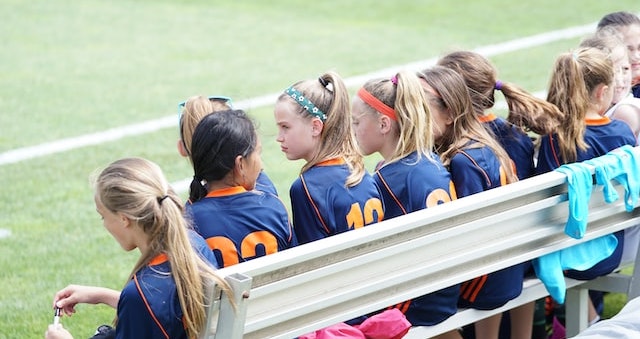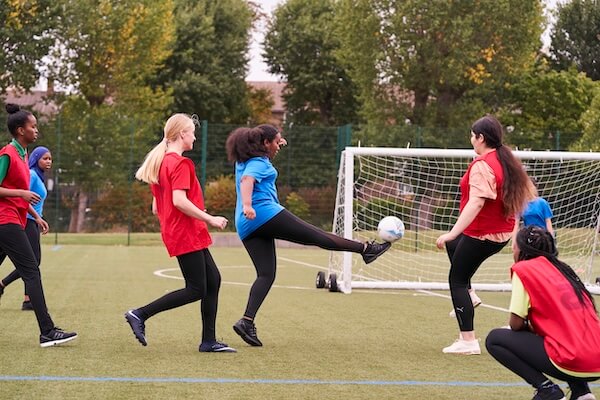
A new study by researchers from the Universities of Strathclyde, Edinburgh, Bristol, and Georgia in the US has shed light on the benefits of regular physical activity on adolescent mental health. The study revealed that regular moderate to intense physical activity during the ages of 11 and 13 was linked with improved mental health. As a parent, you undoubtedly want your child to lead a healthy and active lifestyle, and this latest research suggests that exercise not only benefits their physical health but also their mental wellbeing. In this article, we'll share some tips to help you get your child moving and enjoying exercise, so they can reap the benefits for their mental health as well as their physical health.
Celebrate Success
When your child achieves a fitness goal or makes progress towards
being more active, celebrate
their success. This could mean going out for a special treat
or simply praising them for their hard work. Celebrating success
will encourage your child to continue working towards their
fitness goals.
As an example, our kids school recently started a run club encouraging kids to arrive slightly earlier to school and participate in a run. When kids reach milestones over time - 100 laps, 200 laps and 300 laps they are rewarded by medals in a school assembly in front of all their friends. And they have special days, like pancake breakfast day just for kids that have achieved milestones. Our school has seen nearlky 50% of school kids participating regularly due to these rewards.
Start Small
If your child is not used to regular exercise, it's important to
start small. Don't try to get them to run a 5K or join a sports
team right off the bat. Instead, start with simple activities like
walking, biking, or swimming. You can also encourage your child to
play outside more often, whether it's playing tag or shooting
hoops. As your child becomes more comfortable with physical
activity, you can gradually increase the intensity and duration of
their workouts.
Make it Fun
One of the biggest reasons kids don't exercise is that they don't find it fun. To combat this, try to make exercise enjoyable for your child. This might mean playing music during workouts, making up fun games to play while exercising, or finding activities that your child truly enjoys. For example, if your child loves dancing, sign them up for a dance class or encourage them to dance around the house for exercise.
Be a Role Model
Kids learn by example, so it's important to be a good role model
when it comes to exercise. If your child sees you sitting on the
couch all day, they're less likely to want to be active
themselves. Instead, make an effort to be active as a family. Go
for hikes, play sports together, or take family bike rides. Not
only will this be good for your child's health, but it will also
strengthen your bond as a family.
Set Goals
Setting goals can be a powerful motivator for kids. Sit down with your child and discuss some fitness goals that they would like to achieve. Maybe they want to be able to run a mile without stopping or do 10 push-ups in a row. Whatever their goals may be, help them come up with a plan to achieve them. Ensure you also celebrate each milestone along the way to keep your child motivated and encouraged.
Limit Screen Time
One of the biggest obstacles to getting kids to exercise is the amount of time they spend in front of screens. Limiting your child's screen time can be a great way to encourage them to be more active. Set clear rules around screen time and stick to them. Encourage your child to find other activities to do instead of sitting in front of the TV or playing video games.
Encourage Active Hobbies
Encouraging your child to take up active hobbies can be a great way to get them moving. Consider signing them up for martial arts classes, gymnastics, or dance lessons. These activities not only provide exercise, but also teach important skills like balance, coordination, and discipline.
Make Exercise a Priority
If you want your child to take exercise seriously, you need to make it a priority in your family's life. This means scheduling time for exercise and making sure it's a part of your daily routine. Try to find activities that the whole family enjoys and make them a regular part of your schedule.
Keep it Varied
Doing the same exercise routine day in and day out can get boring
quickly. To keep your child engaged and motivated, mix up their
exercise routine. Try out different activities like hiking,
swimming, or cycling. You can also switch up their routine by
incorporating strength training, yoga, or Pilates. Variety not
only keeps things interesting, but it also helps to target
different muscle groups and prevent injury.
Don't Push Too Hard
The Australian
Physical Activity and Sedentary Behaviour Guidelines specify
that children aged 5-12 and young people aged 13-17 should
participate in 60 minutes of physical activity each day. To make
it easier for them to meet this target, we suggest breaking it
down into four 15-minute segments spread throughout the day.
While it's important to encourage your child to exercise regularly, it's also important not to push them too hard. If your child feels overwhelmed or pressured, they may start to resent exercise altogether. Instead, make sure that your child is having fun and enjoying the activity. Encourage them to take breaks if they need to, and listen to their concerns if they're feeling tired or sore.
By starting small, making it fun, setting goals, limiting screen time, encouraging active hobbies, making exercise a priority, celebrating success, keeping it varied, and not pushing too hard, you can help your child develop a lifelong love of physical activity. Remember to lead by example and make exercise a fun and enjoyable part of your family's daily routine.






